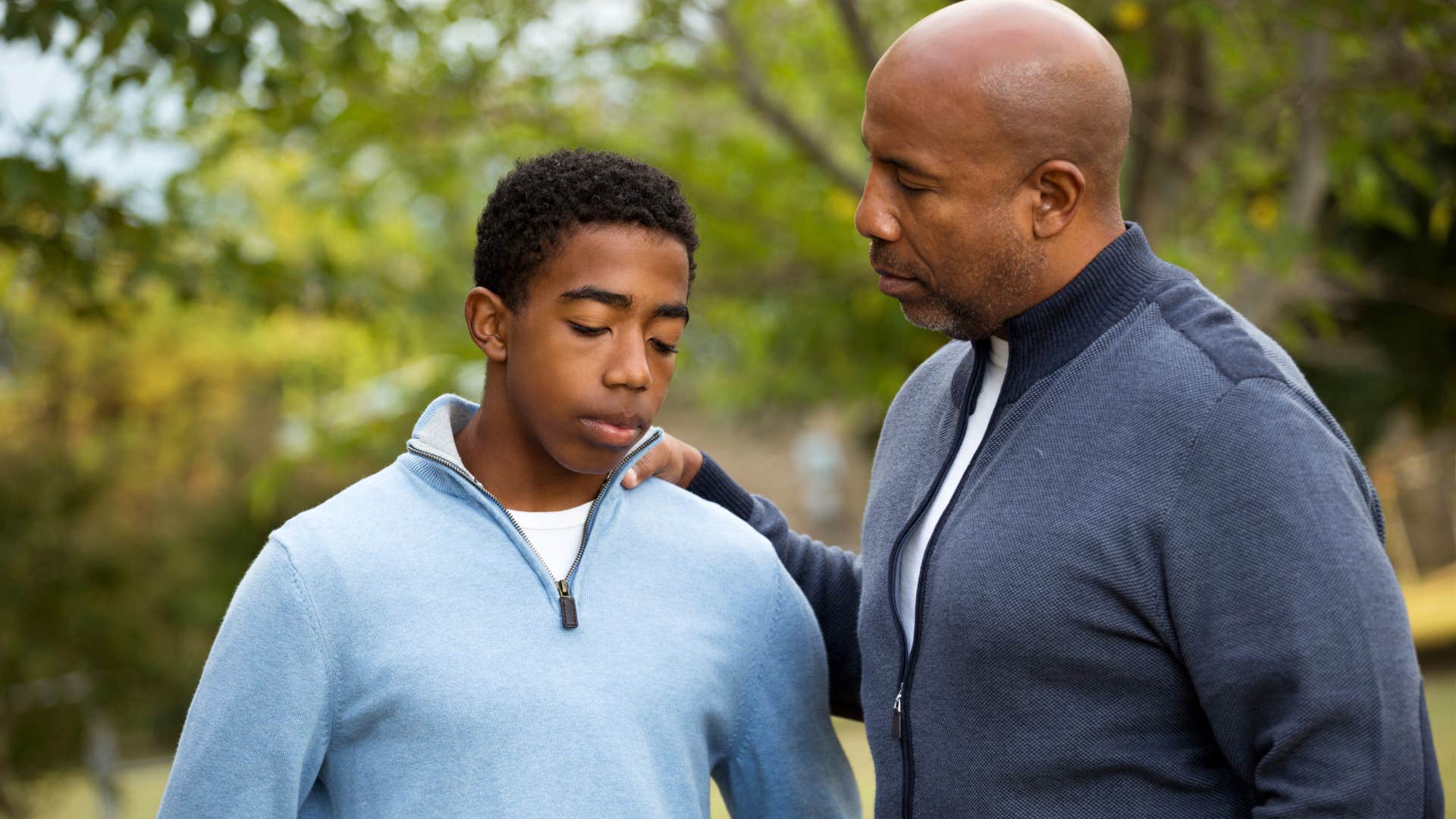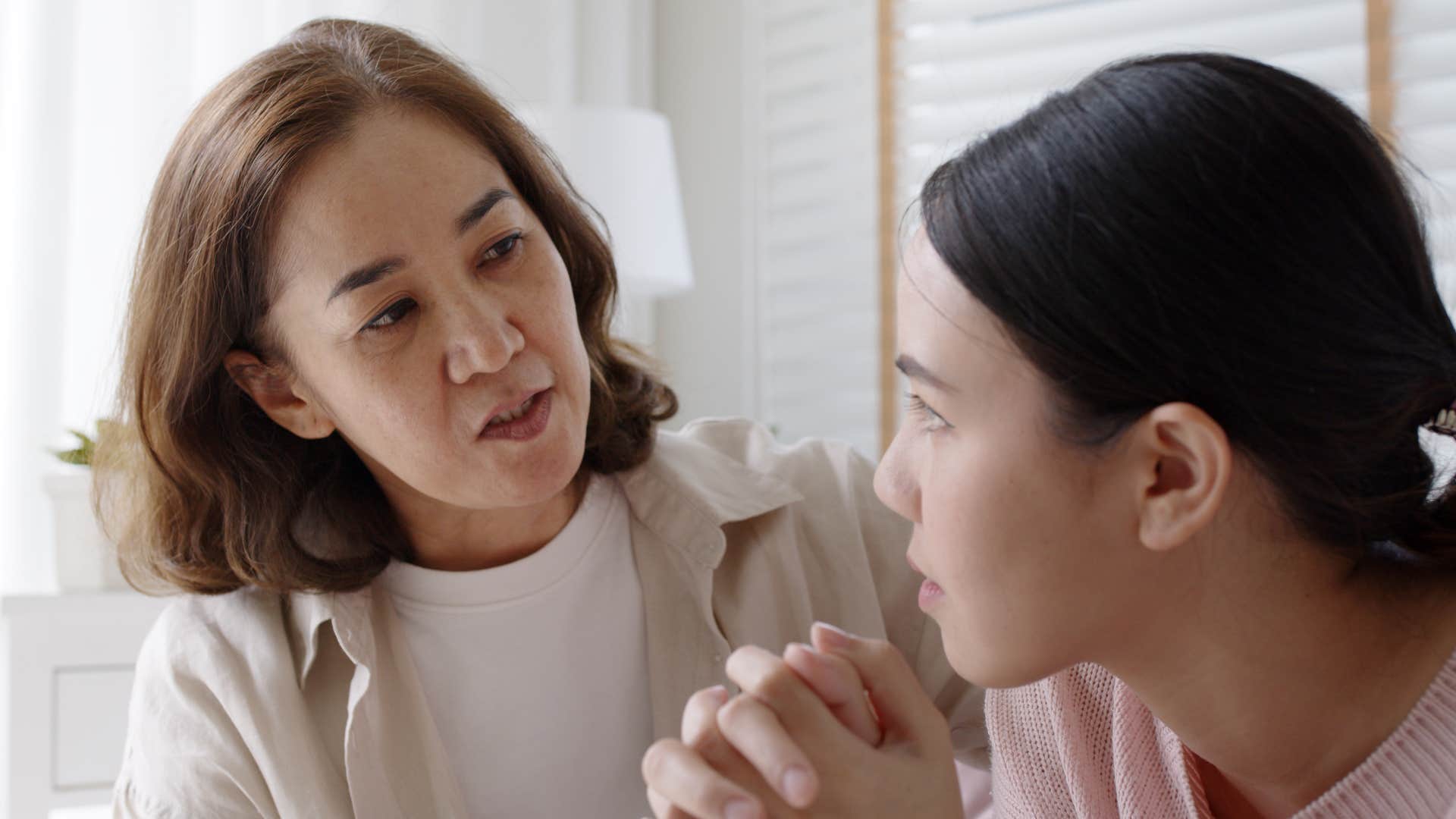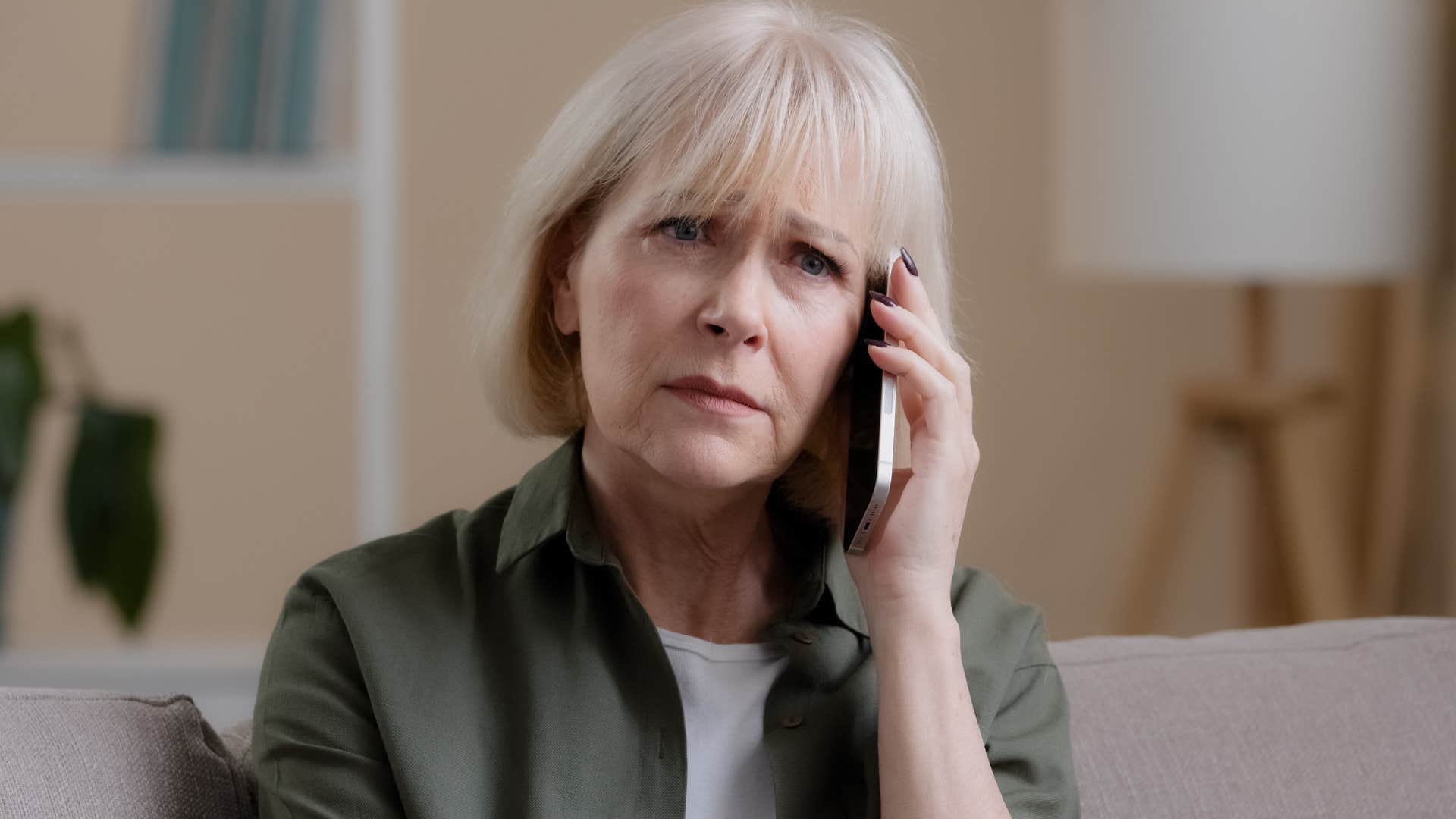11 Phrases Boomer Parents Say That Make Their Adult Kids Shut Down Inside
Disconnect is natural for parents and their adult children. Condescension, resentment, and guilt is not.
 Inside Creative House | Shutterstock
Inside Creative House | Shutterstock There’s clearly a generational disconnect between baby boomers and their kids’ generations, with added tension from misaligned values, communication styles, and even beliefs around family, work, and personal relationships. Of course, parent-child relationships can flourish later in life, despite all those differences, but it takes commitment, grace, and most importantly, grace.
Some common phrases boomer parents say that make their adult kids shut down inside aren’t intentionally malicious, but they can further divide these two generations, sparking resentment and mistrust. Everyone benefits in the long run by being more intentional about language, making a strong effort to empathize with each other, and constantly reminding themselves that they’re human.
Here are 11 phrases boomer parents say that make their adult kids shut down inside:
1. ‘When I was your age…’
 Fizkes | Shutterstock.com
Fizkes | Shutterstock.com
According to parent coach and psychologist Jeffrey Berstein, an unhealthy parent-child relationship and heightened family conflict later in life tend to negatively affect adult children’s wellbeing, independence, and self-esteem.
Conflict seems to erupt easily when coupled with generational tension, but phrases like this — seemingly innocent and funny — dismiss adult children’s struggles and make them feel isolated in their family relationships.
Even if things aren’t the same, from work to relationships and societal norms, that doesn’t mean they’re inherently wrong. Unprompted advice, unsolicited solutions, and condescending language — whether intended to be or not — don’t help anyone feel supported and heard.
2. ‘That’s not a real job’
 ViDI Studio | Shutterstock.com
ViDI Studio | Shutterstock.com
With the emergence of new industries and remote opportunities, it’s not surprising that the new shape of the workforce is disillusioning for older generations of workers who started their careers not only with a “hustle culture” mentality but also in traditional corporate spaces.
For boomer parents who have adult children working from home, making a career in traditionally coined “bridge" jobs, or even frequently job hopping, it can be difficult not to rely on traditional stereotypes about work to judge.
Phrases like “that’s not a real job” or “you have to be loyal to one company” can seem motivational to parents with great intentions, but they often shut down their kids and dismiss their struggles and experiences.
3. ‘You just have to work harder’
 pixelheadphoto digitalskillet | Shutterstock.com
pixelheadphoto digitalskillet | Shutterstock.com
According to a study from the Journal of Managerial Issues, there are many generational differences between Gen Z and Baby Boomers that spark resentment in places like the workplace. Gen Z and millennials value work-life balance above compensation, while their older parental counterparts tend to prioritize company loyalty and growth.
Of course, they may not share the same values about work ethic, boundaries, and work-life balance, but that doesn’t mean phrases like this are acceptable, especially between family members.
The struggles baby boomers experienced early in adulthood are much different from the ones their adult children face today, so empathy, rather than dismissive and invalidating comments like this one, is truly the key to support.
4. ‘You don’t know what you’re talking about’
 Wavebreakmedia | Shutterstock.com
Wavebreakmedia | Shutterstock.com
Dismissive parenting, in which children consistently beg for attention and live with unmet needs, can negatively affect their lives in adulthood, and the same is true for parent-child relationships later in life.
If every conversation between parents and their adult children is plagued by phrases like this, that feel condescending and dismissive, there will be more divisiveness and resentment than support and grace.
It’s important to acknowledge other people’s thoughts, emotions, and opinions, even if they don’t align with yours. You can have a healthy conversation and argument without relying on phrases that shut down adult kids simply for having a different point of view.
5. ‘Just buy a house instead’
 Chay_Tee | Shutterstock.com
Chay_Tee | Shutterstock.com
Many young Gen Zers and millennials are simply giving up on dreams of homeownership in the current economy, struggling to afford monthly rent and basic necessities like groceries and utilities. Coupled with judgment and misguided criticism from their parents in the form of a phrase like this, it’s unsurprising that they’re shutting down and taking space from their families to cope with the stress they’re already experiencing.
Society, the economy, and our culture at large have completely changed from just a few decades ago. Adult children today can’t follow the same traditional paths as their parents, so a lot of the unsolicited advice and guidance their parents offer doesn’t make sense, and it can feel dismissive and judgmental, even when it’s not intended to be.
6. ‘We did fine without therapy’
 Fizkes | Shutterstock.com
Fizkes | Shutterstock.com
Studies show that there’s still a prevalence of mental health stigma living in older generations that not only prevents them from seeking support from resources like therapy, but also affects divisiveness in their relationships with younger family members and peers.
They use phrases like “I’m fine and I didn’t go to therapy” to avoid conversations about mental health, but they also subtly dismiss their adult child’s concerns. If adult children try to express their emotions or ask their parents to lean into vulnerability, a phrase like this only invalidates their feelings.
Of course, therapy isn’t the right choice for everyone, but committing to open honesty, discomfort, and communication in a relationship is essential, especially between adult children and their parents, to craft a healthy dynamic.
7. ‘You’ll understand when you’re older’
 tairome | Shutterstock.com
tairome | Shutterstock.com
Many of the phrases boomer parents say that make their adult kids shut down inside are inherently dismissive and invalidating, further dividing parent-child relationships and sparking resentment, even when they’re not intended to be malicious.
“You’ll understand when you're older” makes adult children feel like they’re not worthy of space to speak or be supported for what they’re experiencing now. The independence and autonomy they’ve worked hard to achieve and navigate are quickly shut down with a phrase like this, which makes them resort back to their childhood identity and all the negativity that may flood in with it.
8. ‘That’s how the world works’
 MAYA LAB | Shutterstock.com
MAYA LAB | Shutterstock.com
Of course, the experience, wisdom, and prompt advice we get from our parents are invaluable at any age, but there’s no denying that the world is constantly shifting and changing. The same advice our parents followed at our age isn’t going to be relevant anymore, but emotional support and a listening ear will always be helpful.
A phrase like “it is what it is” or “that’s just how the world works” may seem like a thoughtful approach to solving an adult child’s struggles, especially for parents who feel an obligation to help their kids minimize issues in their adult lives, but it’s just dismissive.
9. ‘When are you going to settle down?’
 Krakenimages.com | Shutterstock.com
Krakenimages.com | Shutterstock.com
Coupled with societal stigmas and pressures to “settle down” and follow a traditional track of job, marriage, house, and kids, having a parent who uses a phrase like this constantly can urge adult children to quickly shut down emotionally. Considering the majority of parents perceive their adult children to be happy, healthy, successful, and independent, according to a Pew Research Center study, the emergence of a phrase like this in conversation isn’t always intended to be judgment or pressuring — for many people, it really is just a joke.
Yet, regardless of its intent, this phrase can hurt an adult child’s wellbeing, making them feel doubtful, insecure, and like they can never be enough to satisfy their parents, no matter what they accomplish.
10. ‘Why don’t you come over more?’
 Miljan Zivkovic | Shutterstock.com
Miljan Zivkovic | Shutterstock.com
Many parents struggle with the natural disconnection and separation in their family when their kids move out of the house and into their adult lives. For decades, they’ve shouldered the responsibility of looking out for them and parenting them into adulthood, but now that it's here, it’s hard to shut off that parental instinct.
However, guilt-tripping adult children into coming home isn’t the way to cope with that discomfort and separation — healthy boundaries and communication are needed to find a healthy balance. According to psychologist Lynn Margolies, parents who rely on guilt-tripping phrases like this generally lack self-awareness — they feel overwhelmed by their intense emotions and try to leverage pressure and guilt to get what they want.
11. ‘You think you have it hard?’
 SynthEx | Shutterstock.com
SynthEx | Shutterstock.com
Many boomer parents grew up in a world that no longer exists. They entered adulthood, started their careers, and had families in an entirely different cultural, societal, and economic context. Of course, that’s true for any differing generation of people — the world is always changing, but that also means that judging others by our own experiences and struggles isn’t always valid or appropriate.
Phrases like “when I was a kid…” or “You think you have it hard?” aren’t just dismissive of the struggles adult children are facing right now; they invalidate the emotions and feelings they’ve chosen to share with their parents. In the future, they’ll remember these seemingly innocent phrases and decide not to share anymore.
Zayda Slabbekoorn is a staff writer with a bachelor’s degree in social relations & policy and gender studies who focuses on psychology, relationships, self-help, and human interest stories.

